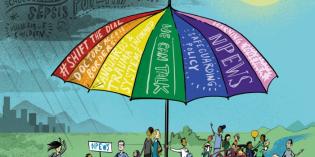Adapting to COVID-19 and beyond
1. Getting the right information to children, young people and families
It has never been more important that children, young people and their families understand where to go for health advice and support. COVID-19 has confused normal routes to accessing health information, and understandably families are hesitant to use health services as normal.
We are publishing tailored advice to parents, young people and for babies under three months so that children and young people are seen in the right place, at the right time, by the right person.
2. Your wellbeing matters
One of the most heartening reactions to the pandemic was seeing so many of you take to social media to share top tips and great ideas for supporting yourselves and your colleagues through such an extraordinary challenge.
We aimed to reflect this by launching our online wellbeing hub in May and it’s great to note that you rated this positively as part of our response to COVID-19.
If you haven’t seen it, please do take the time to appreciate some of the innovative ways that child health teams have been promoting self-care and strong team spirit in the face of adversity.
We will continue to publish more content over the coming months to help you through what is likely to be a tough winter.
We’re also planning a virtual wellbeing event in 2021, which we hope will provide a fun way for members to set a wellbeing goal and share progress with other members, so look out for that next spring.
3. Publishing comprehensive research summaries and guidance, collecting data and sharing QI resources
A new survey on the impact of COVID 19 and winter pressures will be launched. Clinical leads will be asked to respond to a weekly data collection request only if they need to report an issue. This information will be passed to bodies who have committed to standards (eg NHS England, devolved nations govts.), providing the clinical lead is happy for us to share this information.
Research and evidence summaries will be updated on this website so that members have the most up to date information about COVID and how to treat it. A focus will be on the emerging evidence about long-COVID and how this affects children,
The British Paediatric Surveillance Unit will continue to collect data about neonates diagnosed with COVID on a weekly basis during the second wave and cases of children diagnosed with PIMS-TS.
The newly relaunched QI Central website will continue to publish innovative ways of working and support for members to improve the quality and safety of services to children and their families during the pandemic.
4. Continue to provide support and information for trainees
We know that some trainees were severely disrupted by the pandemic, either because of redeployment, limited sub-specialty opportunities or postponed assessments.
In March 2020, we published guidance which covered ARCPs, the disruption to rotations and working patterns and the three levels of training.
More recently, we have now delivered the first remote START assessment for 328 trainees covering the cancelled April 2020 diet. We have also refocused the RCPCH ePortfolio to clarify progression against the Progress curriculum for trainees and trainers and created new reflective items in RCPCH ePortfolio to support training during COVID redeployments, to help trainees demonstrate the curriculum even when redeployed to adult wards.
More guidance and webinars will be published soon for guidance to trainees and trainers on the changes in ePortfolio and how this fits into the educational training model for paediatric learning.
5. Policy guidance for paediatric services
We continue to review and update our guidance for paediatric services as we learn more about the virus, and how services have changed in order to deliver high quality, safe and effective care to children and young people.
With our guidance, position statements and case studies, we support members to make a compelling and evidence-based case that puts children at the centre of winter planning. We're calling on national and local health service leaders across the UK to restore children’s access to the health services they need.
6. Delivering online CPD courses and seminars
The Education & Professional Development team has been working hard to translate all face-to-face courses into an online offering. This has been rolled out with excellent feedback for technical management and accessibility – not to mention retaining the high delegate scores for content and delivery. Dates for spring/summer 2021 are being released currently. Take a look at our courses
Equality, diversity and inclusion
Following the recommendations of our Action Plan and Putting Ladders Down report we have been working to improve our data collection. Early in 2021, we will launch a new and improved diversity monitoring form so that we can collect protected characteristic data more effectively. As part of our Phase 2 work we are also looking at how we can best share an anonymous summary of this data so that we can measure our progress towards achieving the ambitious targets set out in the College’s action plan on equality, diversity and inclusion.
Through our Phase 2 EDI work we are charting how the College can position itself to address wider issues across the protected characteristics. We are focusing on matters raised by members and the priorities highlighted through this survey.
Phase 2 of our EDI work is arranged into four workstreams:
- Working lives of paediatricians
- Health outcomes for children and young people
- Voluntary roles at the College
- The College as an organisation
It is expected that this will lead to a new action plan setting out the College’s ambition across the four workstreams which will be published in early 2021.
We’ll also be using the ideas and suggestions that you provided around volunteering as part of our ongoing work to improve representation across our volunteer roles. Your feedback on how we advertise these opportunities will feed directly into our Phase 2 work and implementation of the recommendations from our Action Plan. We look forward to reporting our progress back to you, and you can see more on our EDI web pages.
Focus on retention
Earlier this year, Dr Dal Hothi was appointed as Officer for Retention, with a remit to focus on identifying how the College can make the specialty as fulfilling as possible.
We also recognise that consultant careers have changed dramatically in the last ten years, so are committed to providing you with helpful and timely careers advice.
The RCPCH has received some funding from the Dinwoodie foundation to support our ongoing research into retention difficulties in paediatrics. As part of the research, the project team is analysing the 1,100 suggestions you made for tackling retention so that our proposed solutions are focused on real experiences and insight from the frontline.
Our careers and mentoring services will benefit from a greater understanding of the issues and both services will be a focus for expansion in 2021.
International member engagement
We asked members outside the UK what new activities would add most benefit to their College membership. Online education and international conferences were identified as the two activities most likely to add benefit.
This data will help to inform our future plans, particularly knowing that we should focus on strengthening our online education provision for international members.
We will seek to build on our forthcoming RCPCH Conference Singapore in association with the 9th Singapore Paediatric & Perinatal Annual Congress by developing further conferences and educational events in partnership with other partners around the world.
Children and young people's engagement
Following the coproduction of Recipes for Rights, inspired by the answers in the 2018 Members survey, RCPCH &Us will coproduce online training sessions with children, young people and members, to support the top two answers selected by members in the 2020 survey which are: “how to involve children and young people in shaping local services” and “how to break down barriers to children and young people’s involvement locally”.
And, given the success of the COVID-19 “Recovery Plan Priorities from Children and Young People” briefing issued by young people in October 2020 and introduced on our summaries of key findings on children and young people's views, we will coproduce briefings, information and resources with children, young people and members that provide their insight on the top two answers as selected by members in the 2020 survey.
These are: “making children and young people friendly services” and “how to involve children and young people in shaping services” - and these will form part of the RCPCH Children and Young People’s Engagement Committee work plan for the next 18 months.
Communications and engagement
The College teams responsible for planning communication and engagement activity have noted members' continued preference for a range of ways of hearing from and communicating with the College. We are committed to both developing and improving existing channels (email and website are still key for members) and developing content in new ways, such as increased use of podcasts and video content.
The Milestones editorial team is grateful for the hundreds of suggestions and comments they received about the magazine. There was great feedback on the children and young people's content - so look out for more of that in future, along with a greater emphasis on the work our international members do right across the globe.
While many readers love the hard copy format and it’s a strong part of the magazine’s identity, it’s also clear that some of you would prefer to receive the magazine electronically into your inbox. The team is now actively exploring how to deliver the virtual magazine in the most eye-catching way possible.
Campaigns and member representation
The year has shown (and this is underlined by the survey results) that our members really like it when we stand up and advocate for the rights and opportunities of children and young people.
This issues-based approach to campaigning, media and public affairs will be developed further in 2021 including though our first national policy campaign.
You can read a summary and full version of the survey results.










